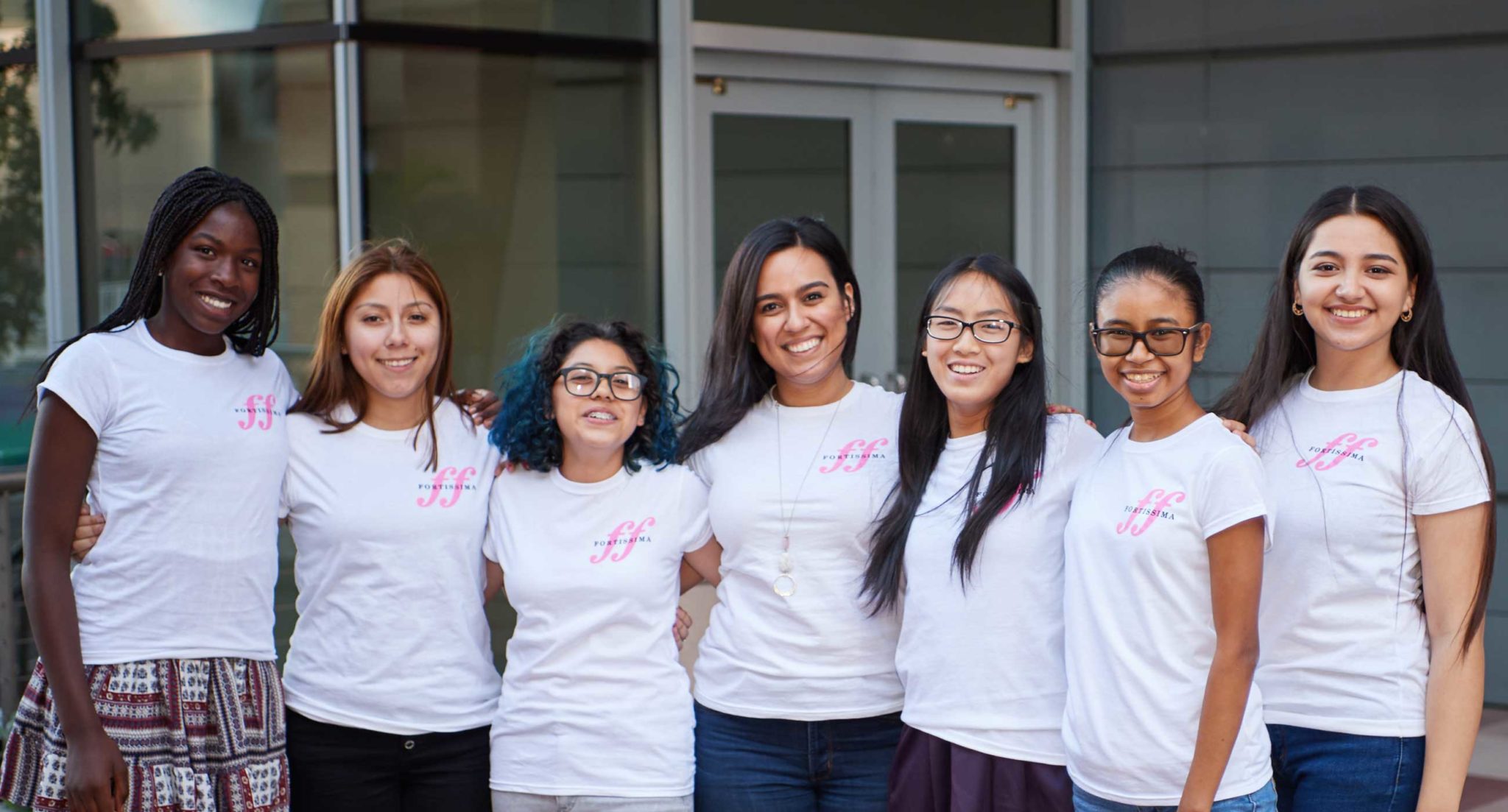Imagining Classical Music Without Patriarchy
- Posted by - American Youth Symphony
- on -

Jazmín Morales, pictured with the inaugural cohort of Fortissima fellows, is the Manager of Community Engagement and Career Development in the Colburn School’s Center for Innovation and Community Impact. Image courtesy of The Colburn School.
by Jazmín Morales
A few months ago — as I was about half-way down the rabbit hole that is my Instagram explore feed — I stumbled upon the account of @terrilynecarrington as she announced the launch of her Institute of Jazz and Gender Justice at Berklee College of Music. The image she posted with the announcement was a combination of three words I had never seen together before.
It read “Jazz Without Patriarchy”.
My first thought was “Wait, that sounds amazing but what does it even MEAN?!” and my second thought was “Oh, yes, this is God’s work.” And I snapped my fingers and did a happy dance around my living room as I reveled in the knowledge that there are other women (of color!) out there working to dismantle systems that no longer serve our art forms and imagining new futures instead.
But my happy dance was quickly interrupted by a question that arose and stopped me in my tracks: What about classical music…what is classical music without patriarchy?
When it comes to gender parity among musicians, classical music is actually in much better shape compared to jazz. For example, the New York Philharmonic currently has 46% women (just about average for top American orchestras), whereas there are currently no women whatsoever on the same property in the Jazz at Lincoln Center Orchestra. However, when we consider the gender makeup of conductors, composers, conservatory faculty, board and leadership in our field, the numbers are utterly dismal in comparison. Not to mention that even though many American orchestras are approaching gender parity, there are still huge gender disparities among instruments in those same orchestras.
Clearly, there is still much work to be done. So, we arrive back at the question: what is classical music without patriarchy?
There is no denying that our tradition, like many others, has historically been driven by men – largely because classical music pre-dates important milestones in women’s history, including our rights to education, voting, and equal wages (actually, we’re still working on that one). Of course, this didn’t stop a handful of exceptional, trail-blazing women who went against the odds and composed and performed classical music anyway.
I believe it is time to begin deeply questioning and re-examining the history of our tradition, and determine which elements are worth hanging on to, and which need to go. Patriarchy, I believe, falls in the latter category.
To be clear, classical music without patriarchy does not mean classical music without men. In fact, we need men – awakened, egalitarian men – to champion and support this cause alongside us. But it does mean classical music will look different than it does now, and we need to be okay with that. Considering that we specialize in preserving music that is hundreds of years old, it seems natural that, as a field, we have been very resistant to change. But the moment has arrived to make a critical decision about the future of classical music: evolve or die.
Though I alone cannot determine what classical music is without patriarchy (we have to do that together!), I do have some suggestions to help us get started:
- Center Women
Prioritize the voices and experiences of women in every aspect of the field as corrective action for the historic marginalization of women in our tradition. We need to focus on equity over equality, because treating everyone the same ignores the systemic oppressions that place us all at different starting points. In order to level the playing field, we need to provide additional support and resources to those who have been historically marginalized.
- Empower Women
Work to place women in more positions of power by helping them find the power within themselves. Patriarchy teaches us that women do not belong in positions of power and that women are even powerless over their own bodies. We must work to undo this by intentionally re-distributing power to women in all aspects of the field. (Bonus tip for men: next time you’re in a meeting and a female colleague says something brilliant that is ignored by the group and a male colleague later says the same thing and is lauded for it, speak up and recognize her for having made the point first because chances are she has been conditioned not to do that for fear of seeming “bossy” or “intense”).
- Accept Women
Make space for our bodies, emotions, and experiences in all areas of the field. Allow us to fail and try again. See us in our full humanity and give us room to grow.
- Support Women
Invest in our development. Mentor us. Make sure we have what we need in order to succeed (and, yes, for many of us that includes a generous parental leave policy).
- Invest in Women
And by this I just mean PAY WOMEN FAIR WAGES. WHY IS THIS SO HARD?!
- Heal from Patriarchy
Ok, yes, this is the toughest but most important one. We all have some major inner work to do to around this. In my humble and very personal opinion, many men need to heal their wounds around hyper-masculine conditioning which leaves them unable to express and cope with emotions, on top of the societal pressure to achieve and be in charge. Women need to heal collective rage against men for oppression and abuse in big and small ways throughout human history. Once we can hold space for all of these wounds, we can begin to reconcile and heal from the fallout of patriarchy. Men will be able to acknowledge, validate, and take responsibility for the violence of patriarchy. And women will be free to grow into their true power without fear.
- Practice Intersectionality
Surprise! This is actually not just about women. This is about all marginalized groups. But I’ll save that discussion for another blog – imagining classical music without white supremacy, perhaps?
- Remember we are Connected
Lila Watson, an indigenous artist, activist, and academic famously said, “If you have come here to help me, you are wasting your time. But if you have come because your liberation is bound up with mine, then let us work together.” Let these wise words guide our work.
The suggestions I offer above are merely a starting point. Those of us actively working to make our field more accessible and accepting of marginalized people have some difficult work ahead of us, but I truly believe that we can all work towards equitable solutions and ultimately see classical music grow and flourish by embracing others. The good news is that we are not alone on this journey. Other disciplines are grappling just as intensely with these questions, and if we are smart, we will watch and learn from them.
—
Jazmín Morales is a violinist, activist, and administrator dedicated to helping artists use their gifts to enact meaningful change in the world. Currently, she serves as the Manager of Community Engagement and Career Development at the Colburn School. A classically trained violinist who also grew up playing mariachi and other regional Mexican music, Jazmín has spent her life and career navigating the space between Western and folk art traditions, and working to support others — especially other women of color — in those fields. She recently launched a pilot program called Fortissima, which is a leadership development program for young women of color in classical music. Before joining the Colburn School, she was the Artist Services Coordinator at La Jolla Music Society. Jazmín earned her B.A. in Ethnomusicology from UCLA and M.A. in Arts Management from the Center for Management in the Creative Industries at Claremont Graduate University.

